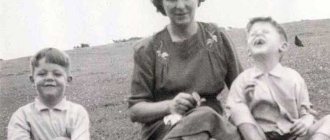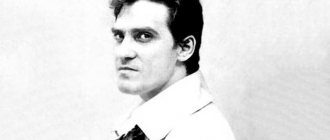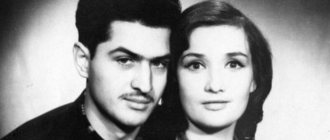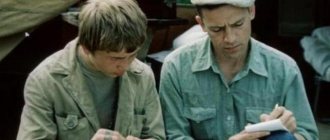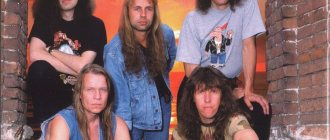Childhood and family of Valery Obodzinsky
The future great tenor was born in Odessa, during the years of its occupation by the Nazis at the beginning of 1942.
The boy's parents went to the front, so little Valera was raised by his grandmother. His uncle, who was a little older, once stole sausage from a German, which caused the latter’s severe anger. The German almost shot both kids. They were saved from death by Obodzinsky’s grandmother who arrived in time. Valery went to school in 1949, but studied poorly. It was a hungry time. Largely because of this, as well as for the sake of easy money, the teenager got involved with the local punks. Valera already sang beautifully and taught himself to play the double bass. A crowd of boys came to the local beach, Obodzinsky began to sing, distracting the vacationers, and the boys deftly picked out their pockets. The little thieves divided the entire “profit” equally.
Obodzinsky's records sold millions of copies
It is known that Obodzinsky first got seriously drunk at the age of fifteen. He quickly developed this addiction, which he lived with all his life.
Obodzinsky's nickname as a teenager was Tsuna. He could often be seen in the mid-fifties on Primorsky Boulevard, surrounded by boys. Valery played the guitar, which he mastered on his own, and sang. Later, the boy found himself in a traveling group, where he sang and played the double bass. For some time he studied at the Kostroma Music School.
Persecution and prohibitions
Along with the number of fans, the number of ill-wishers also increased.
The press increasingly published negative articles about Obodzinsky, and the number of concerts decreased sharply.
The fate of an artist at that time often depended not only on his talent, but also on the ideas of beauty of the great Furtseva, the then Minister of Culture of the USSR.
Valery Vladimirovich, unfortunately, did not escape the fate of those who annoyed Ekaterina Alekseevna. Once the minister paid a visit to, walked through the workshops where there was only one record in production. It was Valery Obodzinsky's disc. Furtseva was beside herself with anger: “Do you have the whole plant working for Obodzinsky alone?!” By order of the imperious Ekaterina Alekseevna, all the performer’s records were demagnetized.
Concert venues in the capital were closed to the singer. He was allowed to perform only on provincial stages. TV shows with the participation of the disgraced artist were no longer shown.
On the eve of 1976, Obodzinsky started drinking. Mental imbalance was reflected in the singer’s performances. The group “True Friends”, with which Valery worked, left him. In 1986, the artist left the stage.
The first songs of Valery Obodzinsky
The turning point in the singer’s creative life was the meeting in 1964 with Pavel Shakhnarovich. They met in Norilsk. Shakhnarovich then performed in Oleg Lundstrem's orchestra, and Obodzinsky sang and played the double bass, being an unknown performer. The young singer’s pleasant voice impressed Shakhnarovich, and he recommended him to Lundstrem immediately after returning to the capital. Soon Obodzinsky began working in Lundström's orchestra, which made him a professional.
The main hit of Valery Obodzinsky - These eyes are opposite
Having met the musical scene in the capital, Valery began performing songs by young authors. It should be noted that venerable authors at that time did not want to work with a “rootless” novice performer.
Height, weight, age, How old is Valery Obodzinsky
Many modern admirers of the singer’s talent want to know exactly what this legendary man was like. They are interested in such questions as height, weight, age. How old Valery Obodzinsky was when he passed away is an equally popular question.
So, official sources say that the singer’s height was 172 centimeters, with a weight of 62 kilograms. However, in the last years of his life, the singer gained weight up to 85 kilograms, these are the physical characteristics that Valery Obodzinsky had during his lifetime. Photos in his youth and now, unfortunately, will not be possible, because the artist passed away at the age of 55.
Valery Obodzinsky's greatest hits
Obodzinsky attracted attention during a performance in Bulgaria, where he performed the song “Moon on a Sunny Beach.”
Three years later, the performer received an invitation to move to the Philharmonic Society of the city of Donetsk. As part of it, he traveled all over the country. Millions learned about the singer Obodzinsky. His performances were a huge success. In those years, and even today, people remember songs such as “These Eyes Opposite”, “Witchcraft”, “Oriental Song”. The singer's first record sold thirteen million in the late sixties. The increase in popularity led to increased criticism in official publications. It was often cut from concerts and recordings of “New Year’s Lights”.
Music
Great success came to Valery Obodzinsky in 1967 after touring Siberia and the Primorsky Territory. The popularity was cemented by a trip to Bulgaria, where the singer performed the song “Moon on a Sunny Beach,” which had become quite fashionable. When the first long-playing record “Valery Obodzinsky Sings” was released in the late 60s, the entire circulation was instantly sold out.
Valery Obodzinsky on stage
The state was enriched by the talent of the young performer by 30 million, and the singer himself received a fee of only 150 rubles. Financial injustice will be a concern for Obodzinsky for the rest of his career. All subsequent discs with the singer's recordings sold out instantly. The phenomenal interest in him can be explained by his unusual manner of performance, velvety voice and excellent lyrical timbre.
Moreover, Obodzinsky never studied vocals and when singing he used rather his innate hearing and musical flair. In addition, the artist’s high professionalism and ability to work should be noted. He could rehearse one verse for several hours, remaining tireless at a time when the orchestra musicians were already falling off their feet.
Valery Obodzinsky with the ensemble
All this together led to the fact that the popularity of Valery Obodzisky in the 70s was incredible. The songs “These Eyes Opposite”, “Oriental Song”, “Falling Leaves”, written by David Tukhmanov, “How many girls in the world” and “March of the Paratroopers”, written by Alexander Zatsepin, have survived to this day.
In addition, Valery introduced Soviet listeners to songs from the repertoire of the Beatles, Karel Gott, Joe Dassin, Tom Jones and many other Western stars, whose music was practically unavailable in the USSR. Moreover, Obodzinsky did not just cover their songs in Russian, but gave these compositions his own sensual, passionate and somewhat grotesque style.
“Bullying” by Obodzinsky
Obodzinsky’s too relaxed behavior on stage was often condemned in the press; such behavior was called “Western.”
His songs talked about love, but not about love for the party and the Motherland. For about a year, all the performer’s performances were banned in the USSR. This situation could only be corrected by Shauro, who at that time headed the Department of Culture of the CPSU Central Committee. He really liked Obodzinsky’s work, so he again got the opportunity to go on stage. And yet, the singer had many ill-wishers. They continued to write about him in the press in a negative way, and his concerts were cut short. Minister of Culture Ekaterina Furtseva also had a negative attitude towards Obodzinsky.
An article in the newspaper “Soviet Culture” about Obodzinsky changed a lot. After its publication, the performer began to perform many concerts and tours. Everything “collapsed” on the eve of 1976. Obodzinsky started drinking. This, of course, could not help but affect his performances. The group working with him, “True Friends,” left him. There were fewer and fewer concerts. In 1986, Obodzinsky completely left the stage.
The Soviet “elite” against Obodzinsky
Not everyone liked such popular love for the artist. His performances began to be cut from television and radio broadcasts, he was no longer included in touring groups, his concerts were simply prohibited. The party was outraged by the “Western” behavior and creativity of the singer; if he sings about love, then it should be love for the Motherland. All attempts to organize tours in the West were harshly suppressed. But Obodzinsky did not change himself and remained true to his art. But the pressure “from above” still affected the singer’s physical and psychological state. He began to abuse alcohol and drugs, his concert director Pavel Shakhnarovich even put him in psychiatric wards under a false name. But the artist’s fortunes were broken, and by the mid-1980s he finally left the stage.
Channel One showed a serial film about the fate of Obodzinsky
A turning point meeting with his second wife
Obodzinsky divorced his wife. He got a job at a tie factory, where he worked as a watchman and lived there in a temporary hut. The situation was changed by a meeting with his longtime fan Anna Yesenina.
Valery Obodzinsky with his second wife
Thanks to Yesenina, Obodzinsky began to sing again. He turned to songs written by Vertinsky. At first I performed two of his works, and later recorded an entire audio cassette.
In the Rossiya concert hall in 1994, the singer gathered spectators who gave him a standing ovation. Obodzinsky began to go on tour often, but he still had binges from time to time.
Creative crisis
From the second half of the 70s, there was an obvious decline in Obodzinsky’s career. “I started to feel like I was at a dead end. I got bored,” the artist recalled. He realized that something needed to change in life. Valery tried to stage a musical performance based on Shakespeare's sonnets to the music of the composer Filippov, but did not find support for his endeavor. The singer began to drink a lot and quickly felt that the stage and the audience were beginning to turn away from him. The breakdown after a 15-year pause occurred on New Year's Eve 1976, after which it was difficult to stop. He did not fight for his former glory and in 1987 completely left the stage. After this, Obodzinsky managed to work as a watchman at a warehouse and a tie factory. Attempts to leave the country and emigrate to the United States also led to nothing.
Only a few helped Obodzinsky get out of the steep dive. Most of those with whom the singer previously worked tried not to notice his problems. One of the few who lent a helping hand to Valery was L. Derbenev, who wrote several songs especially for him. Later, thanks to the persistence of his common-law wife A. Yesenina, he recorded nine songs by A. Vertinsky. In 1994, Valery Vladimirovich performed in front of the general public in the Rossiya concert hall. This was the first appearance on stage after a long break. Despite the use of alcohol and drugs, Obodzinsky managed to maintain his phenomenal voice, receiving thunderous applause from the assembled audience.
Then the singer resumed touring and toured the stages of several Russian cities. The singer’s last public performance was filming the TV show “Golden Hit.” Valery Obodzinsky died of a heart attack on April 26, 1997. He was buried at the Kuntsevo cemetery in the capital.
Personal life of Valery Obodzinsky
The first wife of Valery Obodzinsky was Sverdlovsk resident Nelly Kuchkildina. In March 1961, the singer performed a concert in Irkutsk and drew attention to a girl sitting in the second row. Without taking his eyes off the spectator, Valery began to perform songs from Elvis Presley's repertoire and dashingly twirl the double bass.
In the photo: Obodzinsky's first wife Nelly Kuchkildina
The sympathy turned out to be mutual, and after Obodzinsky’s departure, Nellie received a telegram, letter or long-awaited phone call every evening. Two months later, Valery invited Nellie to Karaganda to celebrate the May holidays together. There he proposed to the girl, and after the summer session at the university, Nellie moved to Odessa to be with her lover. The marriage produced two daughters – Angelica (in honor of Obodzinsky’s song “Angela”) and Valeria (in honor of the singer himself). The marriage of Valery and Nelly did not survive Obodzinsky’s constant betrayals and his terrible addiction to alcohol. In 1979, the couple divorced.
Valery Obodzinsky with his daughter Angela
For the next two years, Valery was in a civil marriage with the young beauty Lolita Kravtsova, the daughter of the head of the Black Sea Shipping Company, but the relationship, built solely on passion, did not stand the test of everyday life. In 1984, Obodzinsky, having undergone treatment for alcoholism, returned to his first wife, who made him promise never to drink again.
Valery Obodzinsky with his first wife (in the foreground)
In the summer of 1990, Valery broke his word to his wife and broke up with Nelly again - this time forever. Obodzinsky found himself in a difficult situation: the singer’s career was buried back in 1986, his wife kicked him out of the house, and there was no longer a faithful shoulder nearby to lean on. Valery got a job as a watchman at a tie factory and settled there, in a temporary hut on the territory of the plant. At this time, his longtime fan Anna Yesenina learned about the misadventures of the disgraced singer and decided to find the idol. She found Valery’s phone number, called him, and a casual dialogue ensued... Soon Obodzinsky himself began calling Anna, inviting the woman to visit the tie factory, and after a while they began to live in a civil marriage.
Valery Obodzinsky and Anna Yesenina
Yesenina had access to radio and television and decided to give the faded star a second chance. Her efforts were not in vain: Obodzinsky recorded a new album based on poems by Alexander Vertinsky. Anna Yesenina remained Valery's life partner until the day of his death.
Lived like a sinner, died like a saint. Valery Obodzinsky
© Violetta Basha, Weekly “My Family”
Lived like a sinner, died like a saint
In the seventies, songs performed by Valery Obodzinsky sounded from all windows, in all discos. He was incredibly popular. He was called the favorite of all Soviet women. A naturally beautiful voice, a quick rise, and equally rapid oblivion for many years. Did vodka ruin his talent or did his star life and internal dissatisfaction require an outlet? When his second wife found him after his disappearance, he was a simple watchman and was happy about it! He died at 55, when other men marry for the third or more times. And today he could sing about “Those Eyes Opposite”, and, without a doubt, would still be a favorite of the ladies.
Valery Obodzinsky was born on January 24, 1942 in the city that produced a whole galaxy of comedians, writers and pop performers - in Odessa! Obodzinsky never studied singing anywhere. He was incredibly musical. I memorized completely new songs at once, just by picking up the lyrics. He only learned the notes while working, although he didn’t really need them. He did everything by ear. In his youth, he mastered the double bass as a self-taught singer, and began singing to it. For the first time, Valery appeared on stage as an artist of the youth theater studio of the Odessa House of Culture for medical workers. There were all sorts of rumors about Obodzinsky. He recalled that for some reason everyone considered him a Jew, although he was half Pole and half Ukrainian. He himself joked: “My father and mother are Russian, and I am a Jew.” God be with her, with her nationality! But his passion for the “Russian folk drink” (vodka) played an ominous role in his life. But later. In the meantime... in the summer he sang on the beach, and, of course, with such work, he had acquaintances - half of Odessa. Maybe this is where the passion for alcohol comes from? According to rumors, when Obodzinsky sang, people listened, and beach thieves “cleaned” the pockets of vacationers. The singer himself might not have suspected this. At one time, Valery had to work as a fireman. However, the double bass always remained his passion. Deciding to take his hobby to the level of a profession, he entered the Odessa Music College, after graduating from which he worked as a modest double bassist in an instrumental ensemble. The ensemble members entertained the passengers of a tourist ship traveling between Batumi and Odessa. Obodzinsky’s track record also includes the position of a mass entertainer on the ship “Admiral Nakhimov” that subsequently sank.
The country recognized Obodzinsky
Then it was customary for singers to be “registered” with some regional philharmonic society. And Obodzinsky was “listed” under the Donetsk, and according to some sources even (or later) under the Tomsk Philharmonic. But this is only formal. What actually followed was a tour of the cities of Siberia and the Far East (Krasnoyarsk, Tomsk, Khabarovsk, Vladivostok). Unexpectedly, the tour became his sensational success - the public greeted the unknown performer enthusiastically, the country recognized Obodzinsky. The leader of the jazz orchestra, Oleg Lundstrem, became the “godfather” of Valery Obodzinsky. Pavel Shakhivrovich worked in his orchestra. Once in Norilsk, he saw a boy at one of the concerts who played the double bass well and sang very pleasantly. It was Obodzinsky. Returning to Moscow, Shakhivrovich recommended him to Lundstrem. In 1964, Oleg Lundstrem invited Valery to work together. Obodzinsky worked with Lundstrem for almost three years. Valery first made his mark on the international stage in 1964 at a festival in Bulgaria with Karadimchev’s song “Moon on a Sunny Beach.” Obodzinsky's popularity grew, and he was increasingly invited to radio and television.
There's something about it...
In those years, the then aspiring singer ... and future prima donna Alla Pugacheva toured with Lundstrem's orchestra. Valery Obodzinsky, the favorite singer of all Soviet women, often traveled with them. When Obodzinsky performed, Alla watched him from behind the scenes and thought: “Well, there’s nothing special, why is he so popular?” Then I heard a storm of applause after the next song. “No, that means there is something,” she thought. In 1967, Valery left Lundstrem's ensemble and created his own solo program, with which he toured the cities of the Urals and Siberia. Since September, he has become a soloist in a jazz ensemble led by Boris Rychkov. How did the idol of the seventies live? His official rate for the concert was 13 rubles 50 kopecks, with allowances it came out to about 40 rubles. But Obodzinsky managed to earn three to four thousand a month. In those days, this was the cost of a decent car! In order to “lure” the all-Union star, local philharmonic societies paid him extra from their reserves. He had an absolutely stellar life. Perhaps no one else has had such a number of concerts and such sold-out crowds. In those years, even Muslim Magomayev could not compete with him. During a ten-day tour there could be 14 concerts, that is, often two concerts a day, and this is with a full house! We even had to sell twenty percent of entrance tickets above the norm. That's what Obodzinsky was then. Young people made up the bulk of the audience, and especially girls. “Girls were our scourge,” recalls Shakhivrovich. “We move from city to city—about ten girls always follow us.”
Her name was Nelya
In 1961, Valery met his first true love. And...even stopped drinking. The girl's name was Nelya. When she became his wife, Obodzinsky was only nineteen! And he wasn't famous yet. He promised Nelya not to drink, and even when they were getting married (this was in Krasnoyarsk), he did not drink a single sip of champagne. They had two daughters: Angelica and Valeria. Later, when Obodzinsky sang a very tender Italian song “Angela, you were given to me for luck...”, his fans wondered who he was singing about so soulfully, and few guessed that he was thinking about his daughter. However, he loved his other daughter Valeria no less. And Obodzinsky’s wife had to come to terms with her husband’s extraordinary success... among the ladies. Having become popular, Obodzinsky created his own ensemble “True Friends”. He was unlike the singers of his time. Reviewers noted his innate artistry, and officials scolded him for his “unprincipled” repertoire. At the turn of the 60-70s, everything was very difficult in Obodzinsky’s career. On television, footage of his participation began to be cut out. The poet Leonid Derbenev told how, while watching footage of the New Year’s “Ogonyok”, the then chairman of the State Television and Radio Broadcasting Company Lapin frowned when he saw Obodzinsky: “Remove Gradsky!” They answered him: “Yes, this is not Gradsky, this is Obodzinsky.” “Moreover,” Lapin snapped. Lapin blocked his path to television. But the matter did not stop there. In 1971, the Minister of Culture of the RSFSR Popov came to Obodzinsky’s concert and was shocked by the singer’s “Westernism.” Popov issued an order prohibiting the singer from working in the RSFSR. Only the union republics remained. This lasted about a year. One day, the head of the culture department of the CPSU Central Committee, Shauro, came to his concert. Shakhnarovich invited him to go on stage and “give it his all,” and then put in a good word for the singer in front of the all-powerful man. Obodzinsky was “rehabilitated.”
Document of the era
But at the top there is already an opinion about Valery as a frivolous singer, whose repertoire and manner do not correspond to the “greatness of the era.” The master of the stage Nikita Bogoslovsky stood up for the singer. On March 22, 1974, his article was published in the newspaper “Soviet Culture” under the heading: “Let’s notice the good!” It was an amazing document of the era, evidence of how artists lived under censorship. Bogoslovsky writes: “We haven’t heard Valery Obodzinsky at the capital’s venues for a long time. Several years ago he was rightly subjected to serious criticism, mainly for his cheap style of performance and the lightness of his repertoire. The last concert said a lot. The artist has clearly reconsidered his creative positions. With the exception of two or three works, his repertoire is marked by good taste, the singer’s individual creative style, his own manner, is gradually taking shape. Self-criticism and self-demandingness are felt in everything. The program included a small medley of Obodzinsky's recent hits. And it must be said that it sounded rather colorless against the background of the new works. It is clear that “Those eyes opposite” are a thing of the past...” Further, the wise master resorted to references to authorities: “...Obodzinsky works a lot and fruitfully with the composer David Tukhmanov. It is worth mentioning the unusual in form, melodically inventive song “The Organ is Playing” (words by Mikhail Plyatskovsky). The excellent songs “Melody” by Alexandra Pakhmutova (lyrics by Nikolai Dobronravov), “Looking into the Blue Lakes” by L. Afanasyev (lyrics by Igor Shaferan), “Witchcraft” by A. Flyarkovsky (lyrics by Leonid Derbenev) and especially the lovely song by Eduard Kolmanovsky sounded warmly and expressively “Alyosha” (poems by Konstantin Vanshenkin)”
She brought roses to every concert of his
Whatever the authorities think, the most beloved song among the people was “These Eyes Opposite”. It came from all the windows and sounded in discos. And its performer became the idol of all women. It was difficult to get a ticket for Obodzinsky’s concerts; fans did not allow him entry. Anna Yesenina was a “professional” fan. Unexpectedly for her, her selfless admiration for her favorite singer turned into something much more serious. In the same turning point for Valery, 1975, Anna stood on the embankment near the Variety Theater and “shot” an extra ticket. “An extra ticket” was asked all over the Stone Bridge. Anna saw a certain gentleman next to Obodzinsky. It turned out to be Pavel Shakhnarovich. As it turned out, Obodzinsky and Shakhnarovich already remembered her, because this girl brought roses to Valeria at every concert. Anna came up and asked for help with the ticket, and Pavel took her hand and led her to Valery Vladimirovich. She became his second wife. Fatal New Year At the very zenith of his fame, the singer began to drink too much... But he held on for exactly fifteen years! From the first wedding. During the meeting of the new year, 1976, Obodzinsky said: “I’ll drink vodka now.” They began to beg him, his wife cried. But he drank. And it started rolling... In Omsk, Shakhnarovich put him in a psychiatric hospital under someone else's name. A nurse brought him to concerts and then took him to the hospital. Shakhnarovich made sure that he did not go on stage drunk. But one day he didn’t notice and the singer went on stage drunk. Shakhnarovich stopped working with him. Gradually everyone turned away from him except those close to him. He could drink in the middle of a tour and disappear. He was changing before our eyes. Even his wife did not always know where to look for him.
Warehouse watchman
His wife searched for him and found him in July 1991. I saw it and was shocked. If I met him on the street, I wouldn’t recognize him. He worked as a watchman at a warehouse of a tie factory. He liked it there - no one bothered him. After meeting his wife, he returned home. To all her entreaties to return to the stage, he refused. He didn't want to sing anymore. Why? Anna felt that her husband was tired: on the one hand, insane popularity, on the other, humiliation in front of his superiors. She recalls: “It was as if he had forgotten that he was a singer. He said: I want to be a simple man. He was in pain. He liked to cook, sit at home, and walk his dog, Fima the mongrel.”
I am a saint
In September 1994, Obodzinsky appeared on stage for the last time in a group concert in the prestigious Rossiya Hall. He sang as if there had been no break. He received a standing ovation. And he sang songs... Alexander Vertinsky, but not imitating him, but in his own manner. One day Obodzinsky called Shakhnarovich and said a strange thing: “I’m calling you from the Sergius Lavra. I am a saint." Valery Obodzinsky died on April 4, 1997 at the age of 55. He was buried at the Kuntsevo cemetery. Three hundred people came to see off the singer, among them Joseph Kobzon and Lev Leshchenko. The funeral was unusual. With an elevator leading... to the grave. But here’s what’s surprising: when Obodzinsky’s funeral service was held, the priest said: “Every clergyman dreams of dying like him - he died on Easter. And this means that all sins have been removed from him.”
Music background - “These eyes are opposite”, sings Valery Obodzinsky
Death of Obodzinsky
Obodzinsky died unexpectedly for many.
This happened on April 26, 1997, when the performer was only 55 years old. He did not have any serious illnesses - Valery suddenly became ill with his heart. Anna tried to persuade her husband to call an ambulance, but he flatly refused, curled up under the blanket and lay there all night. Valery did not live to see the morning due to heart failure.
Almost three hundred people came to say goodbye to the singer, among them his stage colleagues: Joseph Kobzon, Lev Leshchenko and others, who abruptly forgot about the persecution in the past and embarked on frank memories. In the midst of the funeral service, a frame with a photograph of Obodzinsky fell to the floor and shattered into pieces with a roar, putting an end to the speeches of those gathered.
The grave of Valery Obodzinsky
Valery Obodzinsky was buried at the Kuntsevo cemetery.
“Vladimirych, let’s give it 100 each?!”
No, he didn't disappear. Lived in Moscow. More precisely, it existed. By that time he no longer had an apartment, nor a family: his wife had left. He lived in a temporary shelter at a tie factory, where he worked... as a watchman. I drank almost every day. Until, in July 1991, fate sent him a meeting with one of his most loyal and devoted fans, Anna Yesenina. “As soon as I found out where he was, I immediately went to his warehouse. When I saw him, I was shocked. If I had met her on the street, I wouldn’t have recognized her. His morning began like this: “Hey, Vladimirych, let’s pull 100 grams each?!” And again, again, again. It was as if he had forgotten that he was a singer. He said: I want to be a simple man. He liked that no one touched him.”
Despite Obodzinsky’s insane popularity, Anna for a long time had no idea what kind of singer he was. Since childhood, she loved Pyotr Leshchenko, Vadim Kozin, Mario Lanza, Lolita Torres. But I was never interested in modern Soviet pop music. And when one day in the mid-70s a friend called her to the Variety Theater for a concert by some Obodzinsky, she exclaimed: “Are you out of your mind?! So that I listen to some Soviet singer?!” But I still went to the concert. And from that day I began to go to all of Obodzinsky’s Moscow concerts. And every time, regardless of the time of year, she gave him roses.
Valery and Nelly Obodzinsky
Anna Yesenina: “When I found him, we sat and drank. And two days later he called me himself: “Baby, help me out!” I took vodka, a snack - and went back to the warehouse! So I began to visit him regularly. Then Valera began to close the warehouse and come to me at night. And in the fall, he decided that he had no need to rush back and forth and had no need to work there at all. I then went on tour as a costume designer with Boris Rubashkin. I had money. And Valera lived with me as if in heaven.
In fact, I was not at all interested in having him live with me. And she even resisted it for some time. But he manipulated me well. “You help everyone,” he said, “but you don’t want to help me.” And then I broke down. Nobody needed him at all. Even my own daughters. The younger Lerka didn’t really know him. When Valera divorced Nelya in 1979, she had just been born. Only then did I drag them and Angelka, his eldest daughter, here.”
